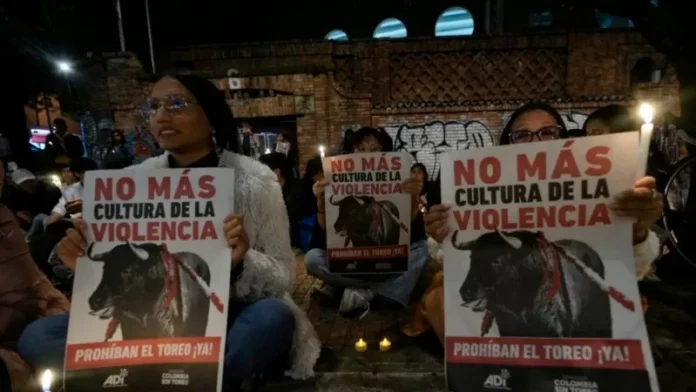BOGOTA, Colombia – The centuries-old tradition of bullfighting in Colombia has been dealt a serious blow as the country’s congress voted to ban this controversial practice. The new law, which is expected to be signed by President Gustavo Petro, will make it illegal to hold bullfights by the start of 2028, giving a three-year span for the tradition to be phased out.
Originating in the Iberian Peninsula, bullfighting has been a part of Colombian culture since colonial times. However, as views on animal welfare have evolved, the practice has faced increasing criticism and condemnation. This ban is a result of years of activism and protests by animal rights organizations and individuals who have been pushing for an end to this brutal spectacle.
For those unfamiliar with bullfighting, it is a traditional event where a matador, or bullfighter, faces an aggressive bull in an arena. The bull is tormented and injured with lances and daggers before the matador ultimately kills the animal with a sword. While once a popular event, broadcasted live on television, it has now become a symbol of animal cruelty and violence.
The passing of this ban is being hailed as a victory by animal rights activists and organizations, who have been working tirelessly to change society’s views on violence against animals. Terry Hurtado, an animal rights activist and city council member in Cali, has been leading protests against bullfighting since the 1990s and is elated by the decision. “This ban is a huge victory for those who have worked towards transforming society and rejecting violence against animals. I feel relieved that bulls and horses, who also participate in these bullfights, will no longer be tortured for entertainment, and that children will no longer be exposed to this spectacle,” she said.
While bullfighting is still legal in a handful of countries, including Spain, France, Portugal, Peru, Ecuador, and Mexico, it has been met with opposition and backlash in many parts of the world. The ban in Colombia is a significant step towards ending this cruel tradition globally and sets an example for other countries to follow.
The ban has been met with resistance from bullfighting aficionados, who see it as an assault on their cultural heritage and a violation of their freedom to continue practicing this tradition. They also fear the economic impact that this ban may have on cities where bullfights are held, as it attracts thousands of visitors each year. However, the fact remains that the ban is a necessary step towards protecting the welfare of animals and promoting a more compassionate society.
Even though the ban will not take effect immediately, it is still a major milestone for animal rights in Colombia. Less than two dozen municipalities in the country continue to hold bullfights, with the annual event in the city of Manizales being one of the most popular. However, with the ban in place, it is expected that these events will eventually come to an end, and the country will join the growing list of nations that have banned bullfighting.
The decision to ban bullfighting in Colombia sends a strong message that society’s views on animal welfare are changing. It is a reminder that traditions and cultural practices must evolve and adapt to align with modern ethical standards. While some may view this ban as a loss of culture or tradition, it is, in fact, a step towards creating a more humane and compassionate society for all creatures.
In conclusion, the ban on bullfighting in Colombia is a landmark decision that will undoubtedly have a ripple effect on the rest of the world. It is a victory for all those who have fought for the welfare of animals and a reminder that it is our responsibility to stand up against any form of cruelty, even if it is dressed up as tradition. We can only hope that this decision will inspire other countries to take a stand against bullfighting and end this barbaric practice once and for all.

